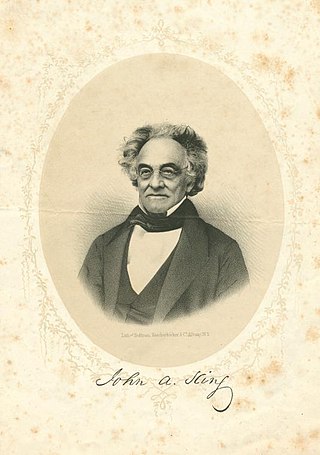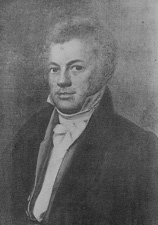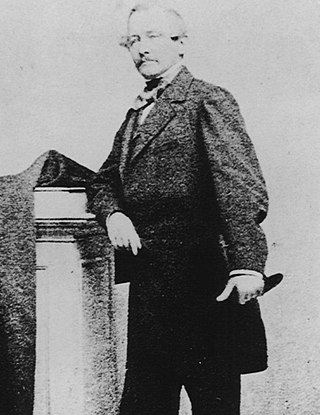
Martin Van Buren was the eighth president of the United States, serving from 1837 to 1841. A primary founder of the Democratic Party, he served as New York's attorney general and U.S. senator, then briefly as the ninth governor of New York before joining Andrew Jackson's administration as the tenth United States secretary of state, minister to Great Britain, and ultimately the eighth vice president from 1833 to 1837, after being elected on Jackson's ticket in 1832. Van Buren won the presidency in 1836 against divided Whig opponents. Van Buren lost re-election in 1840, and failed to win the Democratic nomination in 1844. Later in his life, Van Buren emerged as an elder statesman and an anti-slavery leader who led the Free Soil Party ticket in the 1848 presidential election.

Kinderhook is a town in the northern part of Columbia County, New York, United States. The population was 8,330 at the 2020 census, making it the most populous municipality in Columbia County. The name of the town means "Children's Corner" in the language of the original Dutch settlers (Kinderhoek). The name "Kinderhook" has its root in the landing of Henry Hudson in the area around present-day Stuyvesant, where he was greeted by Native Americans with many children. With the Dutch kind meaning "child" and hoek meaning "corner", it could be that the name refers to a bend in the river where the children are. The eighth president of the United States, Martin Van Buren, was born in Kinderhook and retired to it.

John Alsop King was an American politician who was the twenty-second governor of New York from 1857 to 1858. He was the 1st Republican governor of New York.

Reuben Eaton Fenton was an American merchant and politician from New York. In the mid-19th century, he served as a U.S. Representative, a U.S. Senator, and as Governor of New York.

James Gore King was an American businessman and Whig Party politician who represented New Jersey's 5th congressional district in the United States House of Representatives for one term from 1849 to 1851.
John Evert Van Alen was an American surveyor, merchant, and politician from the U.S. state of New York. He served as a Federalist member of the United States House of Representatives.

Peter Silvester was an American politician who was a member of the United States House of Representatives from New York, and a prominent Federalist attorney in Kinderhook. He was a mentor to Martin Van Buren, the 8th President of the United States and was the grandfather of New York Representative Peter Henry Silvester.

Charles Edward Dudley was an American businessman and politician. A member of Martin Van Buren's Albany Regency, Dudley served as mayor of Albany, New York, a member of the New York State Senate, and a U.S. Senator.

Cornelius Van Alen Van Dyck, M.D. was an American missionary physician, teacher and translator of the Protestant Bible into Arabic.

John Van Buren was an American lawyer, official and politician. In addition to serving as a key advisor to his father, President Martin Van Buren, he was also Attorney General of New York from 1845 to 1847.

Abraham Van Buren II was an American soldier and the eldest son of Martin Van Buren, the eighth President of the United States and his wife, Hannah Hoes Van Buren. A career soldier and veteran of the Second Seminole War and Mexican–American War, Van Buren was named in honor of his paternal grandfather Abraham Van Buren, an officer in the Albany County militia during the Revolutionary War.
James Isaac Van Alen was an American politician from Kinderhook, New York. A Democratic-Republican, he served as a United States representative, a member of the New York State Assembly, and Surrogate Judge of Columbia County, New York. Van Alen was the elder half brother and law partner of U.S. President Martin Van Buren.
Archibald Ladley Linn was a U.S. Representative from New York.

Samuel Birdsall was an American lawyer and politician who served one term as a U.S. Representative from New York from 1837 to 1839.
Isaac V. Vanderpoel was an American lawyer and politician. Vanderpoel was a Democratic party mainstay and from 1866 to 1869, had a law partnership with the eventual U.S. President Grover Cleveland.
Henry H. Van Dyck was an American newspaper publisher, financier and politician from New York.
John Pruyn Beekman was an American physician, farmer, banker and politician from New York.
Martin Van Buren, the eighth president of the United States, was the son of Abraham Van Buren (1737–1817) and Maria Hoes Van Alen (1747–1818).
Abraham Van Buren was an American businessman and local public official from Kinderhook, New York. A Patriot and militia veteran of the American Revolutionary War, he was the father of Martin Van Buren, the eighth president of the United States.











